Eastern Cuba cycling holiday
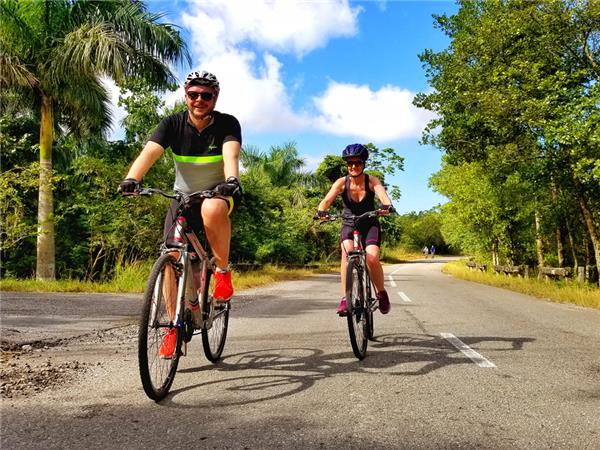
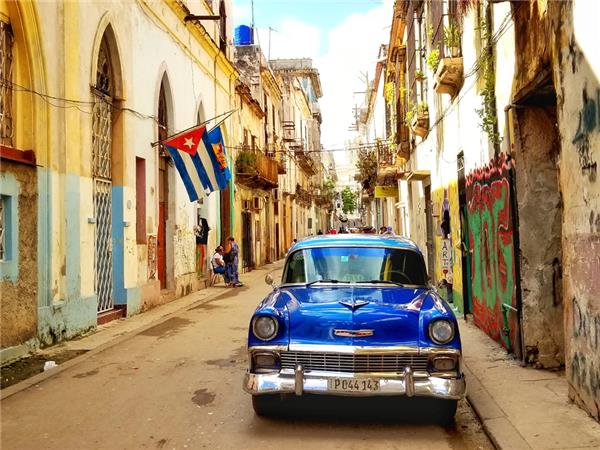
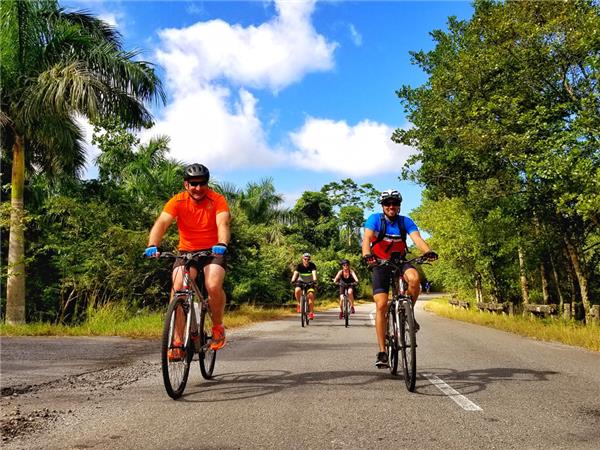
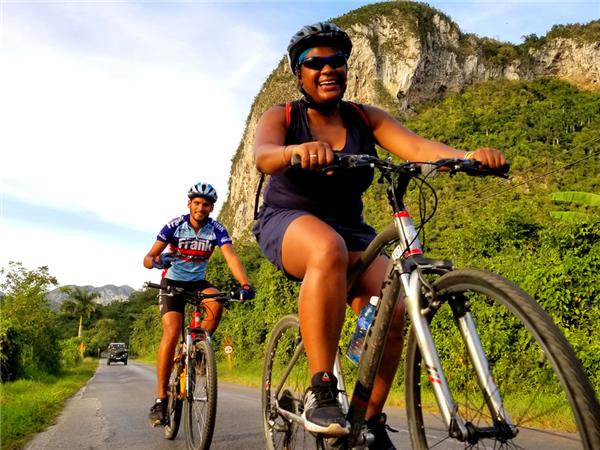
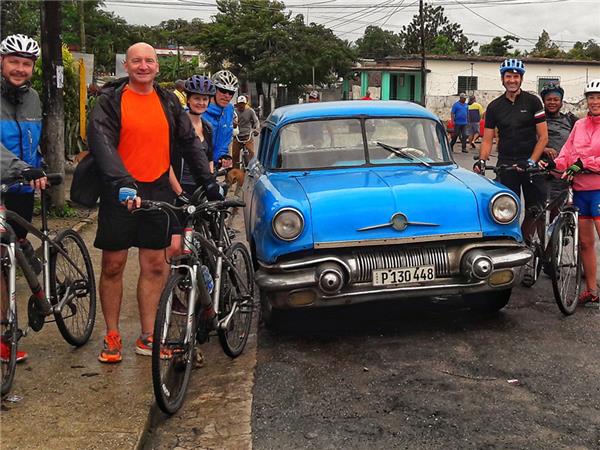
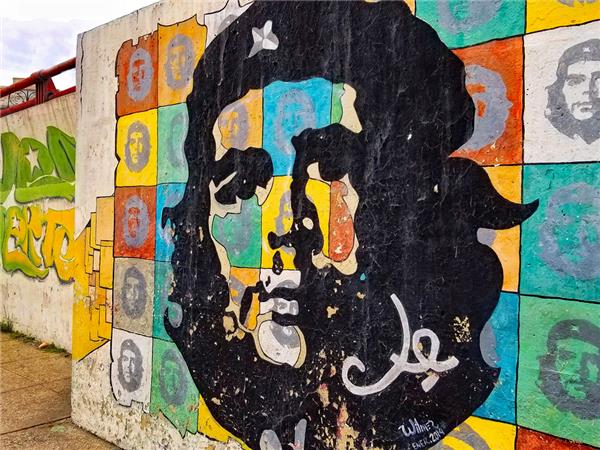
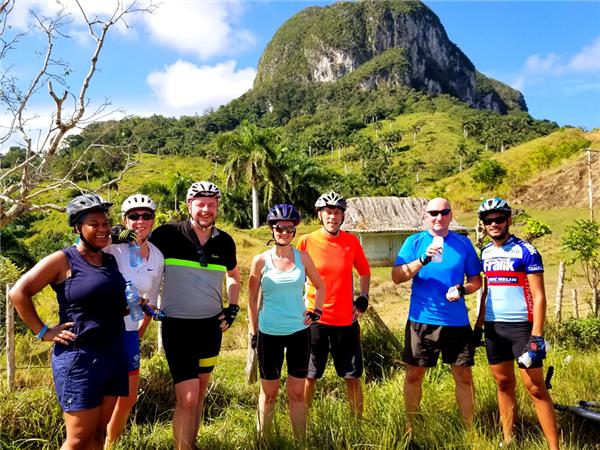
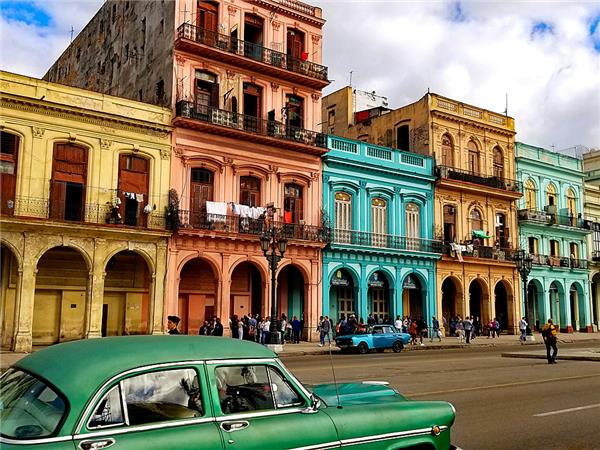
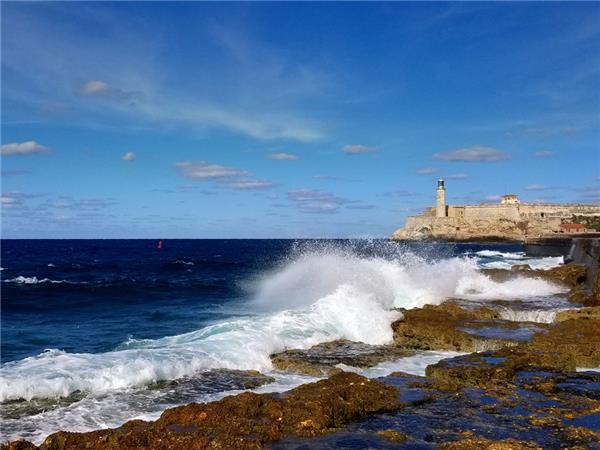
Late availability on these dates: 13 Oct, 27 Oct, 24 Nov, 15 Dec
Description of Eastern Cuba cycling holiday
Ideal for the casual cyclist able to cope with fairly strenuous rides up to 60km in Cuba’s warm climate, this small group tour explores the Caribbean Communist island’s enthralling history and culture from the saddle. While there’s an unmistakable glamour that comes from touring in a classic car, we think the best way to see Cuba is definitely by bike – the sense of freedom is sublime.
You’ll travel point-to-point in a circuit from the capital, Havana, with its handsome fading architecture and Museum of the Revolution. Key destinations include the beaches of the Bay of Pigs – an ideal place to reward your exertions with a refreshing dip in a cenote full of tropical fish.
In Trinidad, admire the Spanish colonial mansions and cobbled streets before riding on to an unmissable Cuba landmark, the Che Guevara mausoleum and memorial, the best place to learn the controversial revolutionary leader’s story. Varadero is known as Cuba’s ‘city of bicycles’, and you’ll spend a day here with the option to go kayaking, dolphin-watching or snorkeling. Or you may prefer to just rest up for a while on the golden sand with a pina colada.
Returning to Havana by Matanazas the terrain becomes a little more challenging with frequent potholes, but this only adds to the feeling of getting off the beaten track. And as this is the birthplace of danzon and rumba, it’s a cultural highpoint of the itinerary.
Get Libre in Cuba on two wheels with this exciting small group tour perfectly suited to the active traveller.
Map
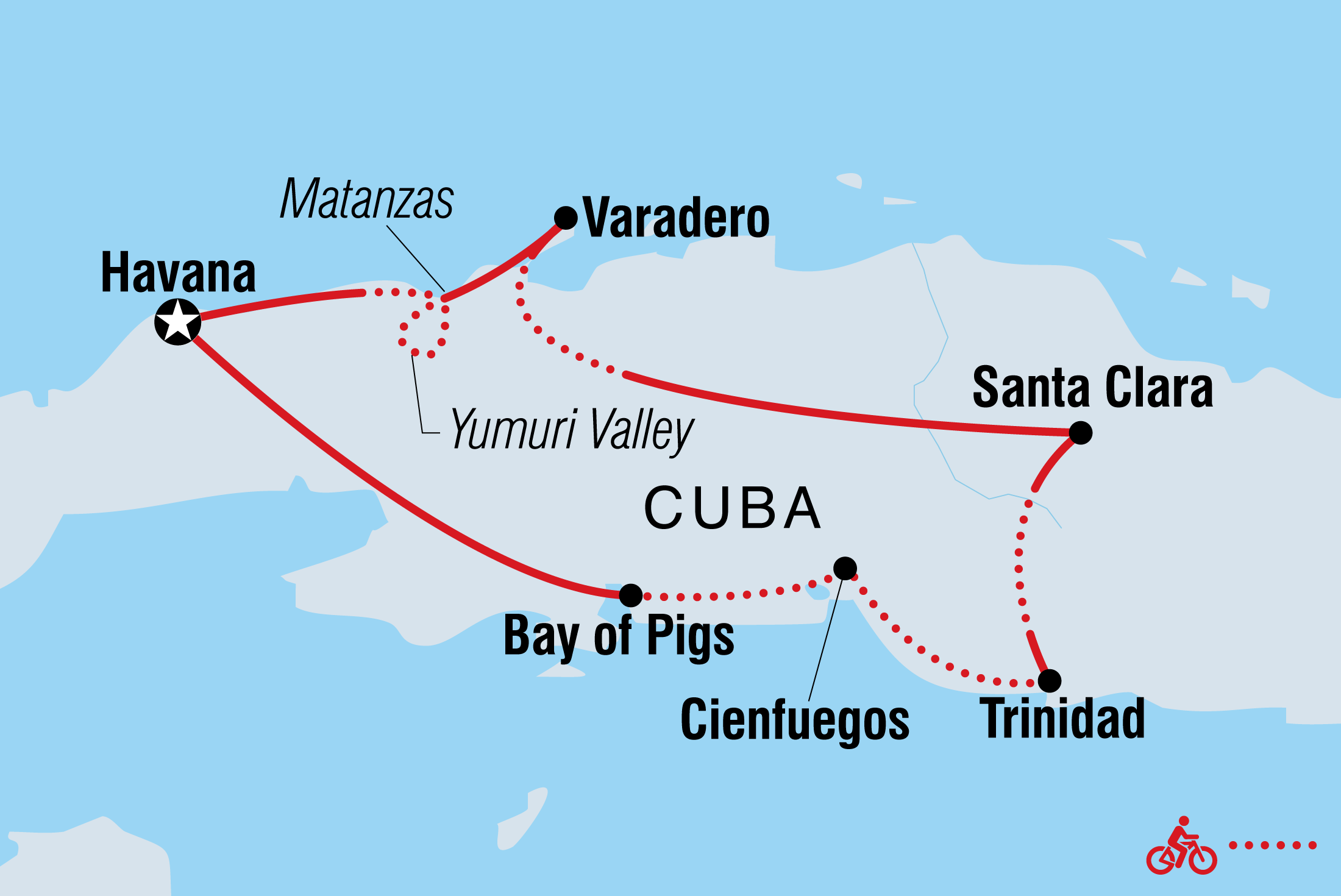
Check dates, prices & availability
Travel guides
Holiday information
Reviews
1 Reviews of Eastern Cuba cycling holiday
Reviewed on 10 Feb 2020 by Gillian Bowden
1. What was the most memorable or exciting part of your holiday?
The cycling with a great leader and group of people and feeling we saw some of the real Cuba, the people and their lives.
2. What tips would you give other travellers booking this holiday?
Don’t expect high standards of accommodation, food, service etc - not realistic in Cuba. Ensure your fitness for the cycling distances and amount of climbing involved and you will enjoy the holiday even more.
3. Did you feel that your holiday benefited local people, reduced environmental impacts or supported conservation?
Yes. Staying in Casas not state run hotels meant families were benefiting and trying to use privately run restaurants again put more money in people’s
pockets. The system of a kitty for snacks and water helped cut down on plastic waste and also recycled to locals the empty plastic containers for other uses.
4. Finally, how would you rate your holiday overall?
Excellent experience.
Responsible Travel
Planet
On cycling trips, it is easy to use plastic excessively, especially in hot climates or during the summer months. Rather than use single-use plastic bottles we refill our water bottles from a large drum kept on our support vehicle. We also encourage people to snack on fresh, seasonal fruits rather than processed fruits in plastic wrappers, and avoid unnecessary items like plastic straws.Throughout this trip we predominantly stay in Casa Particulars (a private room or house) rather than in hotels. This means that fewer precious resources are being used in new construction, helping to preserve traditional housing in Cuba. Nowhere is this more obvious than in beachside Varadero, where we eschew the all-inclusive resorts for a locally run and intimate guesthouse.
Our cycling trips usually have a maximum group size of 16 to minimise our impact on the smaller Cuban communities we cycle through. We believe this is the perfect size for a cycling trip in Cuba while respecting the resource challenges that Cubans face every day. Overtourism is an issue we are very conscious of and we are taking measures to ensure that lowering our impact on the communities we visit, and their environment is our top priority. This means splitting our travellers over several local homes rather than staying in a hotel, or sometimes eating at different venues that would overwise run out of supplies.
Our greatest contribution to minimising our transportation's impact on the environment is to travel by bike, avoiding any use of energy or fuel. When we do use a vehicle, we are committed to providing local experiences and as part of this philosophy we use local forms of transport wherever possible. Where we use private transport, we stick to the small back roads minimising our impact on locals using the main roads for daily routines. Where we do use a support vehicle, we will always ensure that it is an appropriate size to suit the cyclists it supports i.e. no using a 30-seater coach if we only have five people travelling.
On this trip we have joined up with a local Cuban supplier who shares our commitment to responsible business, from waste and water management to ensuring we are leaving as minimal a foot(tyre)print as possible. We ensure they’re educated on all aspects of responsible business and supported in making any changes they need to improve in this regard, while respecting their cultural point of view and local expertise.
People
An important part of travel is mixing with the locals and experiencing “real life” in your chosen destination. On this trip, along with staying in locally-owned homes and guesthouses we visit small cafes and restaurants and buy locally produced crafts and fresh produce. This gives locals the opportunity to earn money directly and our travellers the chance to interact with local Cubans in their everyday environment.We also use only Cuban cycling guides and support staff, as well as local guides in many destinations.
We source local activities which we believe are sustainable to the economy in that they allow the flow of income from visitors to be distributed to a greater audience. This could be as simple as spending time in a local café, to cooking classes in a home and shopping at small local stores. By staying in Casa Particulars (a private room or house) we’re bringing immediate financial reward to the homeowner. We also encourage our travellers to eat with their hosts, helping break the cultural and language barriers. Where this is not possible our local leaders will suggest suitable locally owned and run cafes, including a small micro-brewery in Havana. A great way to break cultural barriers is with a game of dominos – be careful though, it's a national obsession and the locals are frighteningly good at it!
For those interested in the famous Cuban cigars in we visit a tobacco farm in Viñales, where a local farmer will show you how tobacco is dried and then rolled. You’ll also have the opportunity to skip the middleman and purchase straight from the producer.
As well as sharing a meal or two you also have the opportunity to get off the usual tourist trail and cycle through the remote Yumuri Valley, interacting with people who see very few tourists.
A special highlight is meeting the delightful Mama Luisa. A local farmer for many decades, as well as providing a delicious local meal, Mama Luisa specialises in giving the best hugs in all of Cuba – yes, even to sweaty cyclists!
All aspects of this trip (on the ground) are operated by Cubans (most of whom live locally) including all our cycling guides, support vehicle drivers, local site guides, and accommodation providers. We provide our already experienced local suppliers with cycling training so that they are up to speed with the needs of our travellers as well as building their skills. As our local experts we are also careful to ensure that we consult them about the itinerary, and consider any concerns they have, or improvements they may suggest.
Locals know where the best food, souvenirs, local crafts and entertainment can be found. This trip is operated by local Cubans and we ensure any shopping opportunities, from the larger centres like Havana and Santa Clara to the more remote places like the Yumuri Valley offer authentic experiences that showcase Cuba's rich and unique culture.
Food and drink is often a highlight in Cuba and we offer a variety of opportunities to sample the full range, from delicious mojitos and daiquiris to fresh seasonal fruit juices. With severe restrictions on imports the focus is on fresh seasonal food in Cuba with empanadillas and arroz con pollo (chicken and rice) perennial favourites, but for a truly local experience we also recommend trying the boniato con mojo – sweet potatoes in a garlic citrus sauce – it’s delicious!
Cuba also has a rich arts and craft culture, with an emphasis on wood carving, and often highlights the resourcefulness of the wonderful Cuban people. You will commonly see small items such as toy cars made from recycled Coke cans. Rather than shopping in larger tourist shops we recommend checking out the small town markets – and sometimes just the porch of a house – that often feature the work of local craftspeople, and our local leaders will help you where needed.
On this trip, along with genuine interactions with the locals helped by your leader teaching you many Spanish phrases, you will visit many significant places designed to teach you about Cuba's fascinating and often challenging past including the Che Guevara mausoleum and memorial to learn about the country 'second favourite son'.
As part of our commitment to responsible travel a portion of your trip cost will be donated to Bicycles for Humanity – a not-for-profit, volunteer run, grass roots charity focused on the alleviation of poverty through sustainable transport – in the form of a bicycle. In the developing world a bicycle is life changing, allowing access to health care, education, economic opportunity and wider community. A bicycle means you can travel twice as far, twice as fast and carry four times the load, providing a profound and lasting positive effect for the individual as well as their community. Bicycles for Humanity collect donated (used or new) bicycles, repair them if needed and send them to Africa. Along with donated bicycles each of the 40ft shipping containers that Bicycles for Humanity sends becomes a bike workshop, providing employment, skills, training, business, opportunity and economic development for the community in which it's placed, helping the community to move away from aid dependence.
Popular similar holidays
Cycling holiday in Cuba, 7 days
From £1002 - £1255 7 days excluding flights
Explore Cuba on two wheels in one week
Cuba cycling tour, 10 days
From US $2995 10 days including domestic flights only
Enjoy the culture, nature and history of Cuba by bike
Cuba bikepacking cycle tour
From £849 12 days excluding flights
Independent self-guided cycling through rural Cuba











